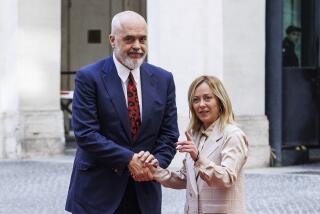Key Agreement on Police Reached in Macedonia Talks
- Share via
SARAJEVO, Bosnia-Herzegovina — Political leaders of Macedonia’s main ethnic Macedonian and ethnic Albanian parties reached an agreement late Sunday on the composition of the country’s police--the second major issue dividing the two sides.
The agreement was announced after intensive negotiations at Lake Ohrid in southwestern Macedonia attended by European Union foreign policy chief Javier Solana, who arrived Sunday to encourage the two sides to reach a deal.
“I am pleased that the issues of language and police are agreed [upon],” Solana told reporters.
A tentative agreement on the status the Albanian language should have in the country was reached last week. A final deal is expected in the next few days.
Solana described the negotiations as “long and sometimes difficult,” and he praised the efforts of all the participants.
“We know that these negotiations will lead to a stable, prosperous and democratic country,” he said.
For more than a month, Western European and U.S. mediators have been pushing the two sides to reach a compromise to avert a civil war. Although a cease-fire is in effect, there have been almost daily violations of it accompanied by rising tensions.
Still, Sunday’s step encouraged diplomats.
“The hard part is behind us,” U.S. special envoy James Pardew said.
Accord Would Increase Diversity
Macedonia, a country of 2 million people, is mostly ethnic Macedonian but has a large Albanian minority that makes up at least 25% of the population.
The agreement reached Sunday includes a commitment to add 1,000 more ethnic Albanians to the country’s police force by mid-2003, according to Western diplomatic sources. Currently, the force is at least 95% ethnic Macedonian.
A second element of the agreement would require that by 2004, the police force generally reflect the ethnic composition of the country and that police from ethnic minorities be deployed to areas where their communities live. However, a request by ethnic Albanians that there be local control of police was not part of the agreement. The police would continue to come under the supervision of the central government in Skopje, the capital.
Also, the international community would be invited to help train and monitor the new police force. Although no one has yet made a direct commitment, it is expected that the Organization for Security and Cooperation in Europe, the European Union and the United States would become involved, according to a Western diplomat.
Finally, city councils would have new lines of communication with local police chiefs. They would have both a voice in choosing the chiefs and the means to convey to the police the views and complaints of citizens. There was a similar system in place when Macedonia was a part of Yugoslavia, from which it broke away in 1991.
Although it appears that the two sides are close to a final deal, there is some uncertainty about whether parliament would be willing to pass the laws necessary to put an agreement into effect and whether all sides would abide by it.
Solana said he believes that both sides would respect a pact. But since February, ethnic Albanian rebels have been engaged in fighting to bring attention to their grievances, and it is unclear whether they would comply. The rebels have not been part of the peace talks, and that has left deep uncertainty about their intentions.
North Atlantic Treaty Organization troops are scheduled to start disarming the rebels within days of a final agreement.
Sticking Points Include Constitution’s Preamble
It is also unclear whether the implementation of an agreement would be able to reverse the many forced migrations that have already occurred as a result of the fighting. Thousands of people have fled their homes, with many ethnic Macedonians leaving those areas that are majority Albanian in the north and west of the country. Some ethnic Albanians, meanwhile, have moved from cities where they were in the minority. Macedonians in particular have been reluctant to return to majority Albanian regions.
The remaining sticking points, according to ethnic Macedonian officials who spoke on condition of anonymity, include the preamble of the constitution, which clearly defines Macedonia as a country of ethnic Macedonians, and the status of the Albanian-language university in Tetovo, a majority Albanian city. Currently, the Macedonian government refuses to fund the school. Ethnic Albanians would like to see the university receive government funds, as do two Macedonian-language universities.
More to Read
Sign up for Essential California
The most important California stories and recommendations in your inbox every morning.
You may occasionally receive promotional content from the Los Angeles Times.











